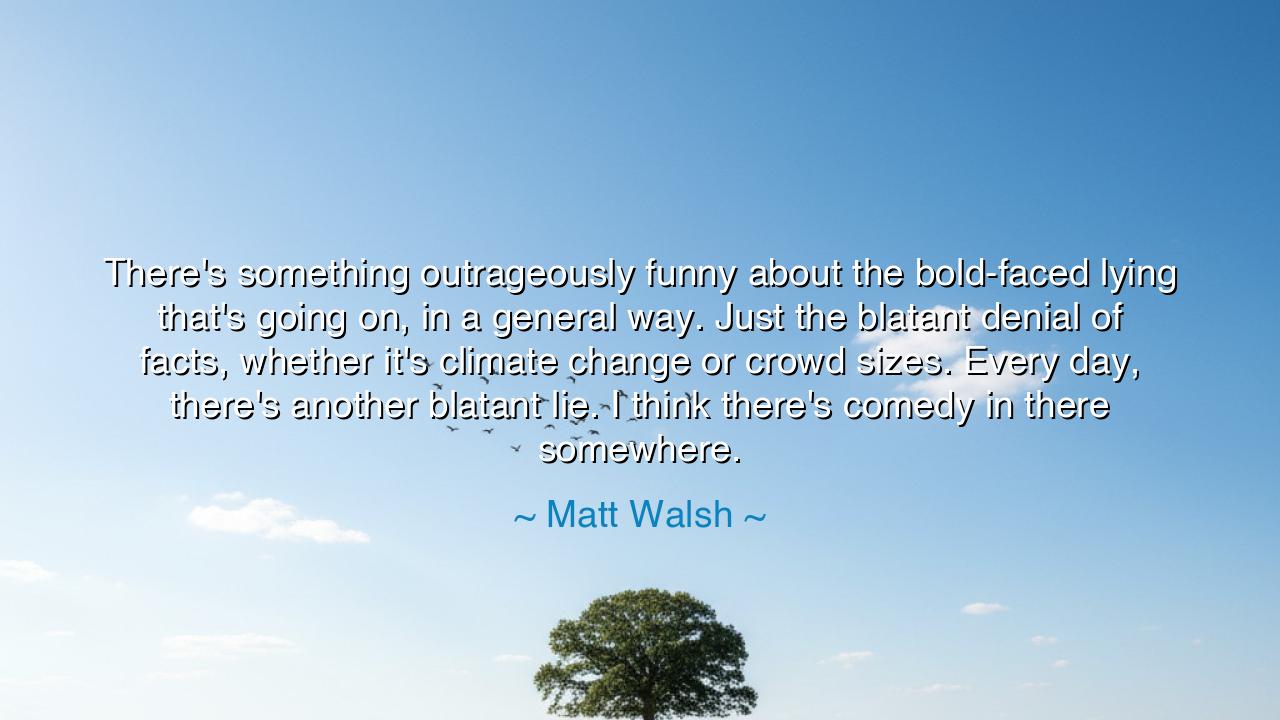
There's something outrageously funny about the bold-faced lying
There's something outrageously funny about the bold-faced lying that's going on, in a general way. Just the blatant denial of facts, whether it's climate change or crowd sizes. Every day, there's another blatant lie. I think there's comedy in there somewhere.






The comedian and observer of modern absurdity, Matt Walsh, once said: “There’s something outrageously funny about the bold-faced lying that’s going on, in a general way. Just the blatant denial of facts, whether it’s climate change or crowd sizes. Every day, there’s another blatant lie. I think there’s comedy in there somewhere.” Though his words speak in the tone of satire, their meaning runs deep — for they touch upon a truth as old as civilization itself: that when the world descends into madness, laughter becomes both weapon and shield. His insight reveals that humor is not only a response to chaos, but a way of surviving it — to see clearly what others deny, and to laugh, not out of cruelty, but out of sanity.
To find something funny in falsehood is not to mock the suffering it causes, but to marvel at the theater of human self-deception. Since the dawn of time, people have bent truth to serve power, comfort, or pride. Yet in every age, there have been those who looked upon the spectacle and saw its tragic hilarity. Walsh’s laughter is that of the ancient fool-philosopher — the jester who speaks truth in jest, who exposes corruption by revealing how ridiculous it is. When facts are denied and lies are paraded as banners of conviction, the mind must either despair or find laughter in the storm. To laugh is not to surrender; it is to resist the poison of despair with the antidote of perspective.
In the time of the ancients, there was a man named Diogenes, who walked through the marketplace of Athens with a lantern in broad daylight, saying he was looking for an honest man. The people laughed at his mockery, yet they also knew it was true. His act was comedy — sharp, cutting, yet filled with the power of revelation. Walsh’s words echo this same spirit. The “blatant denial of facts” he speaks of — the refusal to see what stands plain before us — would have made Diogenes chuckle as well. For the philosopher knew that human folly, when exposed to the light, is not only tragic but comically absurd. The laughter that follows is not one of cruelty, but of awakening.
There is, too, an ancient irony in how lies often destroy themselves. The more loudly they are proclaimed, the more ridiculous they become. The Roman emperor Caligula once declared himself a god, demanding worship from his citizens. His delusion became so extravagant that even his guards laughed behind their helmets. Lies, when carried too far, turn to farce — and farce, in turn, becomes truth’s ally. For laughter has a way of stripping power from deceit. What Walsh calls “outrageously funny” is this very collapse — the moment when falsehood grows so large it devours itself.
Yet there is also a shadow beneath the humor. To laugh at lies is not the same as to ignore them. It is the laughter of those who see clearly but refuse to be broken. When Walsh says he finds comedy “in there somewhere,” he points to a sacred balance — the ability to see the ridiculous in evil without becoming numb to it. For if truth-seekers lose their humor, they lose their hope; and without hope, the world becomes unlivable. Thus, the comic spirit becomes an act of defiance. It reminds us that reality, though twisted by deceit, still belongs to those who can recognize it and smile at its distortion.
Consider Mark Twain, who wielded laughter like a sword. Through humor, he exposed hypocrisy and injustice more powerfully than many preachers or politicians. He saw in the foolishness of his time — the greed, the prejudice, the blind patriotism — both tragedy and hilarity. Walsh’s observation follows in that same lineage: to laugh at lies is to rob them of their majesty. It is to say, “I see you,” and in seeing, to make them small. Comedy, at its best, restores truth to its throne by showing how foolish the pretenders truly are.
The lesson, then, is this: when the world fills with blatant lies, do not drown in rage or silence. Stand firm in truth, but let your heart stay light enough to laugh. For laughter is not weakness — it is wisdom. It keeps the spirit supple, the mind sharp, and the soul uncorrupted. To find humor in falsehood is to affirm that truth still lives within you, untamed and unbroken. The liar may twist reality, but the one who can laugh at the lie still owns it, for laughter belongs to those who see clearly.
Therefore, my child, when you encounter the absurdities of this world — when power denies the sun shines, or when voices shout that wrong is right — do not despair. See the comedy in the chaos. Laugh, not out of mockery, but out of clarity. For the laughter of the wise is a holy sound — the sound of the human spirit refusing to be deceived. And in that laughter, gentle yet unyielding, lies the greatest truth of all: that reality endures, no matter how loudly the world denies it.






AAdministratorAdministrator
Welcome, honored guests. Please leave a comment, we will respond soon